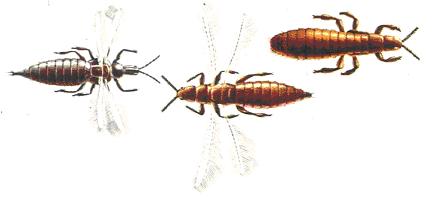m (+ translate tags) |
(Marked this version for translation) |
||
| Line 1: | Line 1: | ||
| − | <noinclude><translate></noinclude> | + | <noinclude><translate><!--T:1--> |
| + | </noinclude> | ||
| + | <!--T:2--> | ||
{{Species id | {{Species id | ||
|common_name = Thrips | |common_name = Thrips | ||
| Line 9: | Line 11: | ||
}} | }} | ||
| + | <!--T:3--> | ||
<noinclude> | <noinclude> | ||
[[Category:Adventist Youth Honors Answer Book/Transcluded Modules|{{SUBPAGENAME}}]] | [[Category:Adventist Youth Honors Answer Book/Transcluded Modules|{{SUBPAGENAME}}]] | ||
</noinclude> | </noinclude> | ||
| + | <!--T:4--> | ||
<noinclude></translate></noinclude> | <noinclude></translate></noinclude> | ||
Revision as of 16:09, 17 January 2019
Thrips (Thysanoptera)
Description: Thrips (Order Thysanoptera) are tiny, slender insects with fringed wings (thus the scientific name, from the Greek thysanos (fringe) + pteron (wing)). Other common names for thrips include thunderflies, thunderbugs, storm flies, and corn lice. Thrips species feed on a large variety of sources both plant and animal by puncturing them and sucking up the contents. A large number of thrips species are considered pests, because they feed on plants with commercial value. Some species of thrips feed on other insects or mites and are considered beneficial, while some feed on fungal spores or pollen. So far around 5,000 species have been described. Thrips are generally tiny (1 mm long or less) and are not good flyers, although they can be carried long distances by the wind. In the right conditions, many species can explode in population and swarm everywhere, making them an irritation to humans.

